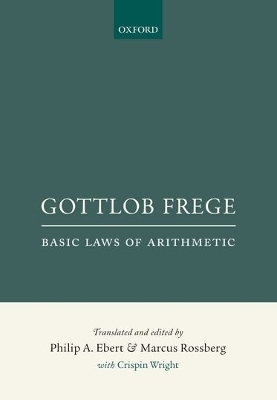
Gottlob Frege: Basic Laws of Arithmetic
Seiten
2016
Oxford University Press (Verlag)
978-0-19-877730-4 (ISBN)
Oxford University Press (Verlag)
978-0-19-877730-4 (ISBN)
This is the first complete English translation of Gottlob Frege's Grundgesetze der Arithmetik (1893 and 1903), with introduction and annotation. As the culmination of his ground-breaking work in the philosophy of logic and mathematics, Frege here tried to show how the fundamental laws of arithmetic could be derived from purely logical principles.
This is the first complete English translation of Gottlob Frege's Grundgesetze der Arithmetik (originally published in two volumes, 1893 and 1903), with introduction and annotation. The importance of Frege's ideas within contemporary philosophy would be hard to exaggerate. He was, to all intents and purposes, the inventor of mathematical logic, and the influence exerted on modern philosophy of language and logic, and indeed on general epistemology, by the philosophical framework within which his technical contributions were conceived and developed has been so deep that he has a strong case to be regarded as the inventor of much of the agenda of modern analytical philosophy itself. Two of Frege's three principal books -- the Begriffsschrift (1879) and Grundlagen der Arithmetik (1884) -- have been available in English translation for many years, as have all the most important of his other, article-length writings. Grundgesetze was to have been the summit of Frege's life's work -- a rigorous demonstration of how the fundamental laws of the classical pure mathematics of the natural and real numbers could be derived from principles which, in his view, were purely logical. A letter received from Bertrand Russell shortly before the publication of the second volume made Frege realise that Axiom V of his system, governing identity for value-ranges, led to contradiction. But much of the main thrust of Frege's project can be salvaged. The continuing importance of the Grundgesetze lies not only in its bearing on issues in the foundations of mathematics but in its model of philosophical inquiry. Frege's ability to locate the essential questions, his integration of logical and philosophical analysis, and his rigorous approach to criticism and argument in general are vividly in evidence in this, his most ambitious work.
This is the first complete English translation of Gottlob Frege's Grundgesetze der Arithmetik (originally published in two volumes, 1893 and 1903), with introduction and annotation. The importance of Frege's ideas within contemporary philosophy would be hard to exaggerate. He was, to all intents and purposes, the inventor of mathematical logic, and the influence exerted on modern philosophy of language and logic, and indeed on general epistemology, by the philosophical framework within which his technical contributions were conceived and developed has been so deep that he has a strong case to be regarded as the inventor of much of the agenda of modern analytical philosophy itself. Two of Frege's three principal books -- the Begriffsschrift (1879) and Grundlagen der Arithmetik (1884) -- have been available in English translation for many years, as have all the most important of his other, article-length writings. Grundgesetze was to have been the summit of Frege's life's work -- a rigorous demonstration of how the fundamental laws of the classical pure mathematics of the natural and real numbers could be derived from principles which, in his view, were purely logical. A letter received from Bertrand Russell shortly before the publication of the second volume made Frege realise that Axiom V of his system, governing identity for value-ranges, led to contradiction. But much of the main thrust of Frege's project can be salvaged. The continuing importance of the Grundgesetze lies not only in its bearing on issues in the foundations of mathematics but in its model of philosophical inquiry. Frege's ability to locate the essential questions, his integration of logical and philosophical analysis, and his rigorous approach to criticism and argument in general are vividly in evidence in this, his most ambitious work.
Philip A. Ebert received his PhD from the University of St Andrews in 2006 and was a Post Doctoral Fellow at the Arché Centre from 2005-2007. Since 2007 he has worked at the University of Stirling. ; Marcus Rossberg received his PhD from the University of St Andrews in 2006 and was a Post Doctoral Fellow at the Arché Centre from 2005-2008. Since 2008 he has worked at the University of Connecticut.
Introduction by Crispin Wright
Translators' Introduction
Frege: Basic Laws of Arithmetic, volumes I and II.
Translators' Notes
Bibliography
Appendix by Roy T. Cook
Index
| Erscheinungsdatum | 13.08.2016 |
|---|---|
| Übersetzer | Philip A. Ebert, Philip A. Ebert, Marcus Rossberg |
| Verlagsort | Oxford |
| Sprache | englisch |
| Maße | 170 x 244 mm |
| Gewicht | 1158 g |
| Themenwelt | Geisteswissenschaften ► Philosophie ► Geschichte der Philosophie |
| Geisteswissenschaften ► Philosophie ► Logik | |
| Geisteswissenschaften ► Philosophie ► Philosophie der Neuzeit | |
| Mathematik / Informatik ► Mathematik ► Geschichte der Mathematik | |
| Mathematik / Informatik ► Mathematik ► Logik / Mengenlehre | |
| ISBN-10 | 0-19-877730-2 / 0198777302 |
| ISBN-13 | 978-0-19-877730-4 / 9780198777304 |
| Zustand | Neuware |
| Haben Sie eine Frage zum Produkt? |
Mehr entdecken
aus dem Bereich
aus dem Bereich
die kolonialen Wurzeln der französischen Theorie
Buch | Hardcover (2024)
Matthes & Seitz Berlin (Verlag)
CHF 41,90
oder Das Leben Montaignes in einer Frage und zwanzig Antworten
Buch | Softcover (2023)
C.H.Beck (Verlag)
CHF 25,20


